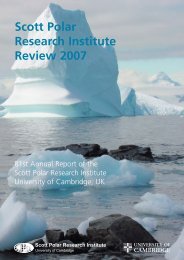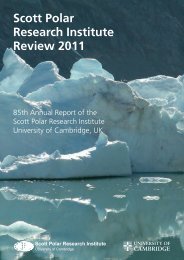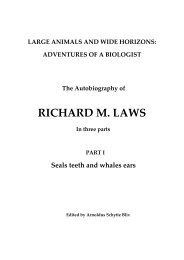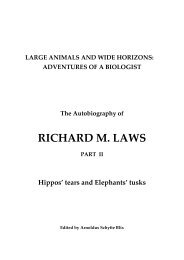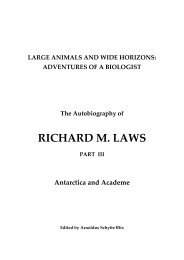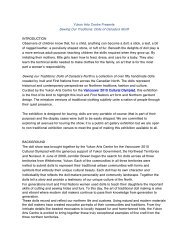Acrobat PDF version of SPRI Review 2004 - Scott Polar Research ...
Acrobat PDF version of SPRI Review 2004 - Scott Polar Research ...
Acrobat PDF version of SPRI Review 2004 - Scott Polar Research ...
You also want an ePaper? Increase the reach of your titles
YUMPU automatically turns print PDFs into web optimized ePapers that Google loves.
Teaching, Learning and Understanding<br />
University Teaching<br />
Academic members <strong>of</strong> the Institute’s staff coordinate and<br />
participate regularly in undergraduate lecture courses in the<br />
departments <strong>of</strong> Geography, Physics and Social Anthropology.<br />
This year a new third year course, ‘The Human Geography<br />
<strong>of</strong> Arctic Regions’ has been taught for the first time by<br />
Michael Bravo and Piers Vitebsky. Undergraduate<br />
supervisions are provided to students in many colleges.<br />
Members <strong>of</strong> our staff are Fellows <strong>of</strong> Christ’s, Churchill,<br />
Darwin, Downing, Jesus, St. Catherine’s, St. John’s and<br />
Wolfson colleges. Our M.Phil. course in <strong>Polar</strong> Studies has<br />
academic strands in Physical Sciences and in Social Science<br />
and Humanities, and staff also contribute to other M.Phil.<br />
programmes taught in the Department <strong>of</strong> Geography. We<br />
have twenty or so doctoral students, registered to study<br />
topics which range from glacial processes and environmental<br />
change to the economic development <strong>of</strong> the Canadian<br />
North and the reindeer herding peoples <strong>of</strong> Siberia. Each<br />
student is nested within one <strong>of</strong> our research groups,<br />
providing a strong and integrated research culture.<br />
Julian Dowdeswell<br />
<strong>SPRI</strong> <strong>Polar</strong> Museum<br />
The Museum continues to introduce the polar regions to the<br />
general public and to parties from schools, and is also an<br />
excellent venue for regularly–held events such as book<br />
launches and receptions. This year has seen the important<br />
acquisition <strong>of</strong> Full Registration <strong>of</strong> the Museum under the<br />
national scheme operated by the Museum, Libraries and<br />
Archives Council (MLA). This is a very significant achievement,<br />
and recognizes formally that we operate at the appropriate<br />
national standards for, for example, access, display and<br />
curatorial care <strong>of</strong> our very significant polar collections.<br />
An exhibition, ‘Shackleton: the Hidden Collections’, was a<br />
major event this year. The exhibition, which included<br />
Shackleton’s diaries from each <strong>of</strong> his four Antarctic<br />
expeditions, was formally opened on 5 May by the Hon.<br />
Alexandra Shackleton, and the event was celebrated with a<br />
reception for about 100 guests. Much <strong>of</strong> the material was<br />
being displayed for the first time. We are grateful to<br />
members <strong>of</strong> the Shackleton family for their gifts to the<br />
Institute. The extensive preparations for the exhibition and<br />
the accompanying ‘Virtual Shackleton’ web site, produced<br />
by Caroline Gunn, were funded through generous support<br />
from the Gladys Krieble Delmas Fund and the UK Arts and<br />
Humanities <strong>Research</strong> Board. The exhibition has been visited<br />
by many people over the subsequent months. The clock<br />
presented to Shackleton at the beginning <strong>of</strong> the Quest<br />
expedition, and inscribed ‘To the Boss from the Boys’, was<br />
repaired at the expense <strong>of</strong> the Friends <strong>of</strong> the Institute and<br />
formed part <strong>of</strong> the exhibition.<br />
Several other acquisitions were made during the year, including<br />
an interesting collection <strong>of</strong> indigenous artifacts from Devon<br />
Island, Arctic Canada. Joe McDowell gave a collection <strong>of</strong><br />
artifacts he used in the Antarctic during the International<br />
Geophysical Year (1957–58) expedition. An unusual gift was a<br />
transverse section <strong>of</strong> mammoth tusk collected during the Vega<br />
expedition (1878–80) and made into a drink coaster. We are<br />
grateful for the donations <strong>of</strong> polar artifacts to the Museum,<br />
which enhance its reputation as a comprehensive collection<br />
from the ‘Heroic Era’ <strong>of</strong> polar exploration in particular. Jennifer<br />
Hirsh’s continuing work with the museum records is also<br />
acknowledged and Tony Billingshurst, Larry Rockhill and<br />
Deirdre Hanna provided assistance in the Museum.<br />
R.K. Headland<br />
Projecting the Significance <strong>of</strong> the <strong>Polar</strong> Regions<br />
Institute staff have continued to give considerable time to<br />
stimulating public interest in the Arctic and Antarctic<br />
through, for example, media work, public lectures and visits<br />
by schools to our polar museum. Appearances were made<br />
by staff on a number <strong>of</strong> radio and television programmes,<br />
including the BBC, ITV and Channel 4 news. Views and<br />
quotations on polar topics, many <strong>of</strong> which include an<br />
emphasis on high–latitude environmental change issues,<br />
have also appeared in newspapers and journals, including<br />
The Times , The Independent and The Guardian. The<br />
acquisition, with the support <strong>of</strong> the Heritage Lottery Fund,<br />
<strong>of</strong> Herbert Ponting’s glass plate negatives <strong>of</strong> <strong>Scott</strong>’s Last<br />
Expedition was featured in The Guardian , The Daily<br />
Telegraph and in both television and radio broadcasts. We<br />
have also been working with the BBC Natural History Unit<br />
on a forthcoming programme on icebergs. Several staff<br />
have given external talks at primary and secondary schools,<br />
in addition to academic seminars at British and foreign<br />
universities. Our regular series <strong>of</strong> Saturday Evening Public<br />
Lectures also attracts audiences <strong>of</strong> between 80 and 100.<br />
20



